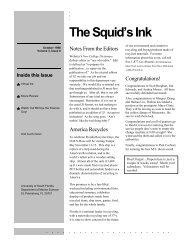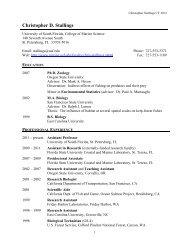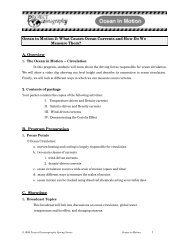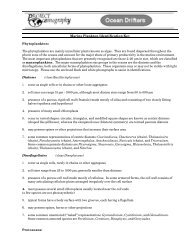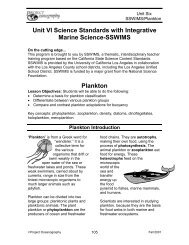Climate change futures: health, ecological and economic dimensions
Climate change futures: health, ecological and economic dimensions
Climate change futures: health, ecological and economic dimensions
Create successful ePaper yourself
Turn your PDF publications into a flip-book with our unique Google optimized e-Paper software.
CONCLUSIONS<br />
AND RECOMMENDATIONS<br />
Just as we underestimated the rate at which climate<br />
would <strong>change</strong>, the biological responses to that<br />
<strong>change</strong> <strong>and</strong> the costs we would incur, we may have<br />
underestimated the manifold benefits we can derive<br />
from a clean energy transition.<br />
The financial sector — having a long time-horizon <strong>and</strong><br />
a diversified international portfolio — is the central<br />
nervous system of the global economy, sensing disturbances<br />
when they begin to percolate in many parts of<br />
the globe. Energy lies at the heart of all our activities<br />
<strong>and</strong> all of nature’s processes. With the energy infrastructure<br />
in trouble, insurers may soon be asking if the<br />
future is insurable.<br />
FOSTERING AWARENESS OF CARBON RISKS,<br />
EXPOSURES AND OPPORTUNITIES<br />
Underst<strong>and</strong>ing the risks <strong>and</strong> opportunities posed by climate<br />
<strong>change</strong> <strong>and</strong> sensitizing others is the first step<br />
towards taking corrective measures. A broad educational<br />
program is needed to better inform businesses,<br />
regulators, governments, international bodies <strong>and</strong> the<br />
public as to the science <strong>and</strong> impacts of climate<br />
<strong>change</strong>. The <strong>health</strong> of large regional <strong>and</strong> global<br />
ecosystems that support us is at stake.<br />
Regulators <strong>and</strong> governments need to underst<strong>and</strong> the<br />
science in order to frame regulations in climate-friendly<br />
ways. Special attention should be given to identifying<br />
misaligned incentives <strong>and</strong> market signals that perpetuate<br />
environmentally destructive practices.<br />
Of the three emerging exposures for the insurance <strong>and</strong><br />
investment sectors — climate instability, terrorism <strong>and</strong><br />
tectonic shifts — the first two may be directly or indirectly<br />
tied to our dependence on oil. Exiting from the age<br />
of oil is the first <strong>and</strong> necessary step toward improving<br />
the environment <strong>and</strong> our security <strong>and</strong> achieving sustainable<br />
development (Epstein <strong>and</strong> Selber 2002).<br />
Together, finance, UN agencies, scientists <strong>and</strong> civil<br />
society can seize the opportunities. The combination of<br />
a) focused lending <strong>and</strong> investment, b) targeted insurance<br />
coverage, <strong>and</strong> c) sufficient <strong>economic</strong> incentives<br />
from governments <strong>and</strong> international financial institutions<br />
can jump-start “infant” industries <strong>and</strong> sustain an <strong>economic</strong>ally<br />
productive, clean energy transition.<br />
POLICIES AND MEASURES<br />
The global nature of the problems associated with a<br />
rapidly changing climate often seems overwhelming.<br />
Multiple measures at various levels are required, but<br />
the political will to undertake them is often difficult to<br />
initiate, much less sustain. Coordinating actions by various<br />
stakeholders can be particularly daunting.<br />
Yet <strong>change</strong> is necessary, <strong>and</strong> involvement of all sectors<br />
of society is needed. With careful steering <strong>and</strong> an<br />
expansive dialogue, societies can reduce risks <strong>and</strong><br />
benefit from the opportunities. With this in mind, the<br />
editors <strong>and</strong> authors of this report have divided proposals<br />
into two categories — fostering awareness <strong>and</strong><br />
taking action.<br />
Firms can better underst<strong>and</strong> their own exposures to the<br />
physical <strong>and</strong> emerging business risks — including litigation,<br />
legislation, shifts in consumer choices <strong>and</strong><br />
activism within civil society. In the energy transition<br />
ahead, companies can identify ways to profitably<br />
address the challenges.<br />
For insurers, climate <strong>change</strong> challenges all aspects of<br />
their core business, including property <strong>and</strong> casualty,<br />
life <strong>and</strong> <strong>health</strong>, <strong>and</strong> financial services. Insurers can<br />
amass more pertinent information on climate risks as<br />
the past becomes a less informative predictor of the<br />
future <strong>and</strong> share this knowledge with other stakeholders<br />
through interactive dialogues.<br />
Investors <strong>and</strong> financial analysts can evaluate portfolios<br />
for climate risks <strong>and</strong> opportunities, <strong>and</strong> capital market<br />
professionals can add climate screens to their study of<br />
balance sheets <strong>and</strong> market possibilities. Capital markets<br />
sometimes miss the “signals” coming from climate,<br />
paying attention only to large, obvious events such as<br />
hurricanes <strong>and</strong> typhoons.<br />
And citizens can learn about their own carbon footprint<br />
— the amount of carbon their own activities<br />
release into the environment — driven by their consumption<br />
patterns <strong>and</strong> political choices. Civil society<br />
has a central role to play in building awareness in all<br />
sectors <strong>and</strong> helping businesses, governments <strong>and</strong> international<br />
financial institutions formulate measures for fundamental<br />
<strong>change</strong> to achieve clean <strong>and</strong> sustainable<br />
development.<br />
107 | FINANCIAL IMPLICATIONS



